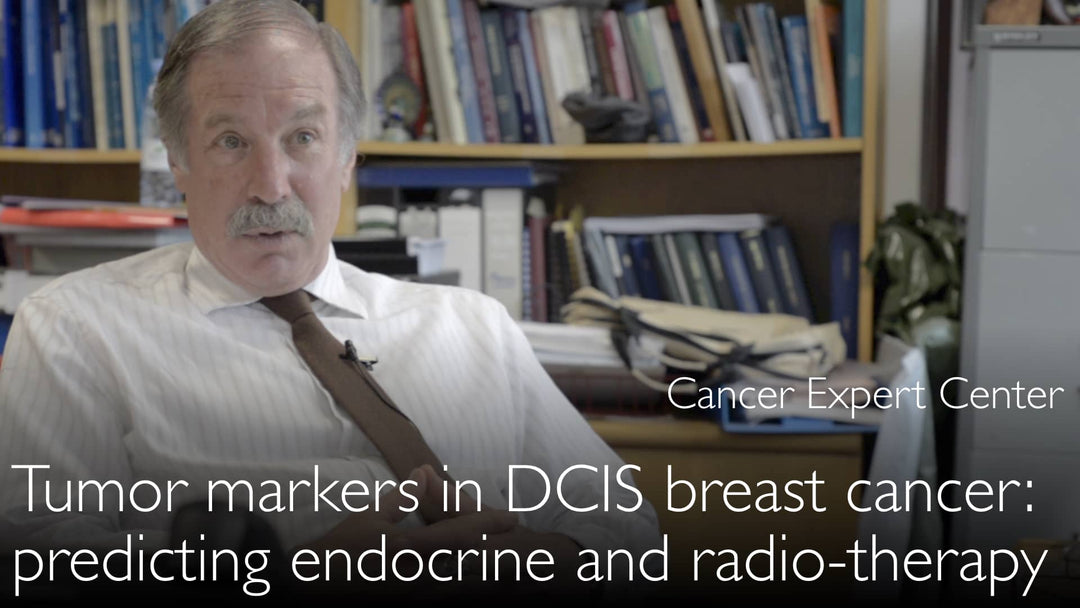O renomado especialista em prevenção e tratamento do câncer de mama, Dr. Jack Cuzick, MD, PhD, explica como marcadores tumorais específicos no carcinoma ductal in situ (CDIS) podem prever recorrências e orientar decisões terapêuticas, identificando pacientes que talvez não precisem de radioterapia ou terapia endócrina.
Predição de Recorrência do Carcinoma Ductal In Situ da Mama e Resposta ao Tratamento com Marcadores Tumorais
Navegar para a Seção
- Compreensão do CDIS e Desafios do Tratamento
- Principais Marcadores Tumorais para Prognóstico do CDIS
- Papel do Receptor de Estrogênio na Terapia Endócrina
- Status do HER2 e Resposta à Radioterapia
- Pesquisas e Ensaios Clínicos em Andamento
- Futuro do Tratamento Personalizado do CDIS
Compreensão do CDIS e Desafios do Tratamento
O carcinoma ductal in situ (CDIS) representa um desafio significativo no cuidado do câncer de mama. O Dr. Jack Cuzick, MD, PhD, enfatiza que nem todos os casos de CDIS progridem para câncer de mama invasivo, o que cria um dilema clínico crítico para oncologistas e pacientes. O principal desafio está em determinar com precisão quais lesões de CDIS têm potencial de progressão e realmente exigem tratamento agressivo além da cirurgia.
Muitos casos de CDIS podem ser adequadamente tratados apenas com cirurgia, evitando assim os efeitos colaterais de terapias adicionais. A pesquisa do Dr. Cuzick concentra-se no desenvolvimento de ferramentas precisas para fazer essa distinção, visando personalizar o tratamento e reduzir o excesso de intervenção.
Principais Marcadores Tumorais para Prognóstico do CDIS
O Dr. Jack Cuzick, MD, PhD, e sua equipe identificaram vários marcadores tumorais cruciais que mostram potencial para prever o comportamento do CDIS. Esses biomarcadores, já consagrados no prognóstico do câncer de mama invasivo, incluem o status do receptor de estrogênio (RE), do receptor de progesterona (RP) e do HER2 (receptor 2 do fator de crescimento epidérmico humano).
Os pesquisadores também investigaram o Ki-67, um marcador que mede o índice de proliferação tumoral. Segundo o Dr. Cuzick, esses marcadores oferecem informações biológicas valiosas sobre as características do tumor CDIS e seu potencial de agressividade, formando a base para abordagens de tratamento mais personalizadas.
Papel do Receptor de Estrogênio na Terapia Endócrina
O status do receptor de estrogênio surge como um determinante crítico para decisões de terapia endócrina no CDIS. O Dr. Jack Cuzick, MD, PhD, confirma que tumores CDIS RE-positivos têm maior probabilidade de se beneficiar de tratamentos endócrinos, como tamoxifeno ou inibidores da aromatase.
Essa descoberta ajuda os clínicos a identificar quais pacientes realmente necessitam de terapia hormonal de longo prazo para reduzir o risco de recorrência. Para pacientes com CDIS RE-negativo, a terapia endócrina pode ser desnecessária, poupando-os de possíveis efeitos colaterais sem benefício clínico. Essa abordagem baseada em marcadores representa um avanço significativo na personalização do cuidado do CDIS.
Status do HER2 e Resposta à Radioterapia
O status do HER2 parece desempenhar um papel crucial na predição da resposta à radioterapia em pacientes com CDIS. O Dr. Jack Cuzick, MD, PhD, revela achados de pesquisa convincentes, embora ainda não publicados, que demonstram essa relação. Os dados sugerem que o CDIS HER2-positivo pode responder de forma diferente ao tratamento com radiação em comparação com tumores HER2-negativos.
Essa informação, apresentada em reuniões médicas científicas, pode ajudar os clínicos a determinar quais pacientes têm maior probabilidade de se beneficiar da radioterapia, bem como identificar aqueles para os quais o tratamento poderia ser evitado, reduzindo a carga terapêutica e os efeitos colaterais.
Pesquisas e Ensaios Clínicos em Andamento
O Dr. Jack Cuzick, MD, PhD, está liderando extensos esforços de pesquisa para validar esses achados iniciais. A equipe está conduzindo um grande ensaio clínico com 1.700 pacientes com câncer de mama para investigar mais a fundo esses marcadores tumorais. Eles já coletaram blocos de tecido de biópsia de mais de mil participantes, fornecendo um conjunto robusto de dados para análise.
Este trabalho em andamento visa estabelecer diretrizes mais definitivas para o tratamento do CDIS com base no perfil molecular. A pesquisa representa um passo significativo em direção à medicina personalizada baseada em evidências para pacientes com câncer de mama em estágio inicial.
Futuro do Tratamento Personalizado do CDIS
A pesquisa conduzida pelo Dr. Jack Cuzick, MD, PhD, aponta para um futuro em que o tratamento do CDIS será precisamente adaptado à biologia tumoral individual. Ao usar múltiplos biomarcadores, incluindo RE, RP, HER2 e Ki-67, os clínicos poderão em breve prever com mais precisão tanto o risco de recorrência quanto a resposta ao tratamento.
Essa abordagem pode reduzir significativamente o tratamento excessivo, permitindo que muitas mulheres com CDIS de baixo risco evitem radioterapia e terapia endócrina desnecessárias. À medida que a pesquisa do Dr. Cuzick avança, promete transformar o tratamento do CDIS de uma abordagem padronizada para um cuidado oncológico verdadeiramente personalizado, baseado em características moleculares.
Transcrição Completa
Dr. Anton Titov, MD: O senhor está liderando ensaios clínicos que identificaram marcadores tumorais específicos no CDIS, Carcinoma Ductal In Situ, um câncer de mama. Esses marcadores podem prever a recorrência do câncer de mama e quais tratamentos podem ou não ser administrados. O que o senhor pode nos contar sobre essa pesquisa?
Dr. Jack Cuzick, MD: Acredito que esta é uma área muito importante da pesquisa sobre câncer de mama. Sabemos que nem todo CDIS progride para câncer de mama invasivo. O primeiro desafio é determinar se este CDIS tem potencial de progressão para câncer de mama invasivo.
Precisamos avaliar se um paciente com CDIS necessita de tratamento adicional. A maioria dos casos de CDIS pode ser tratada apenas com cirurgia. A radioterapia pode nem ser necessária.
Os primeiros marcadores tumorais que examinamos foram importantes para o câncer de mama invasivo. Analisamos a positividade do receptor de estrogênio, do receptor de progesterona e do HER2. Também avaliamos o marcador tumoral Ki-67 como medida do índice de proliferação tumoral.
Esses marcadores tumorais mamários são potencialmente bastante úteis, mas ainda estamos nas fases iniciais da pesquisa. Estamos realizando um grande ensaio clínico baseado em nosso primeiro estudo com CDIS, envolvendo 1.700 pacientes com câncer de mama.
Temos blocos de tecido de biópsia de mais de mil pacientes agora, então esse trabalho está em andamento. O único trabalho concluído foi feito para o receptor de estrogênio e para o receptor HER2 no câncer de mama.
Há evidências de que o HER2 é importante para prever a resposta do câncer de mama à radioterapia. Esse resultado da pesquisa ainda não foi publicado, mas foi apresentado em uma reunião médica científica.
Acreditamos que os receptores de estrogênio são muito importantes para determinar qual paciente com câncer de mama necessita de terapia endócrina.





